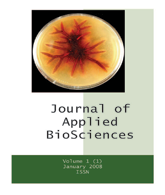Journal of Applied Biosciences (J. Appl. Biosci.) [ISSN 1997 - 5902]
Volume 51: 3591 - 3595. Published March 29, 2012.
Changes in the nutrient composition of the African oil bean meal “ugba” (Pentaclethre macrophylla Benth) subjected to solid state natural fermentation.
Okechukwu R. I1, Ewelike N. C2, Ukaoma A. A3, Emejulu A. A4, And Azuwike C. O1.
1 Department of Biotechnology, Federal University Of Technology, Owerri
2 Department of Microbiology, Federal University Of Technology, Owerri
3 Department of Biochemistry, Federal University Of Technology, Owerri
RESUME
Objectives: This paper investigates the effect of solid state fermentation on the nutritive value of the African oil bean meal “ugba” and the possible enhancement of the nutrient composition was highlighted.
Methodology and results: The processed African oil bean meal-“ugba” was fermented naturally for one week at 270C to determine the effects of fermentation on its nutrient compositions. The chemical analyses of the samples were carried out according to AOAC standard methods. Fermentation brought about an increase in the crude protein and total lipid by 30.80% and 38.80% respectively. Calcium, magnesium, phosphorus, iron and manganese increased up to the 5th day and dropped while Zinc, Na dropped from the 3rd day. The crude fibres and ash content of “ugba” decreased to 1.80% and 0.12% respectively. The values of glycine, alanine cystine valine, leucine, tyrosine, arginine and glutamic acid increased while other amino acids were found to decrease.
Conclusion and application of findings: Fermentation enhanced the nutritive value of “ugba”. This contributed to the reduction of the fibre and ash contents and enhancement of other nutrients like, protein lipid, calcium, magnesium, phosphorus, iron, and manganese which are vital for growth. Thus fermented “ugba” has potential as a cheap source of protein and minerals for feeding pregnant and lactating mothers, malnourished children and feed for animals. The increase in the total lipid content means more calories for man and animals using the fermented substrates as feed or food supplement. The increased minerals like calcium, phosphorus, magnesium and iron, are important in the diet of man and animals. These increases would ensure better mineral supply for the production of healthy infants after childbirth in the case of pregnant mothers. Where shorter fermentation time does not improve the amino acid profile, supplementation with cheap synthetic essential amino acids like methionine should prove useful.
FULL PAPER [PDF AVAILABLE HERE]
